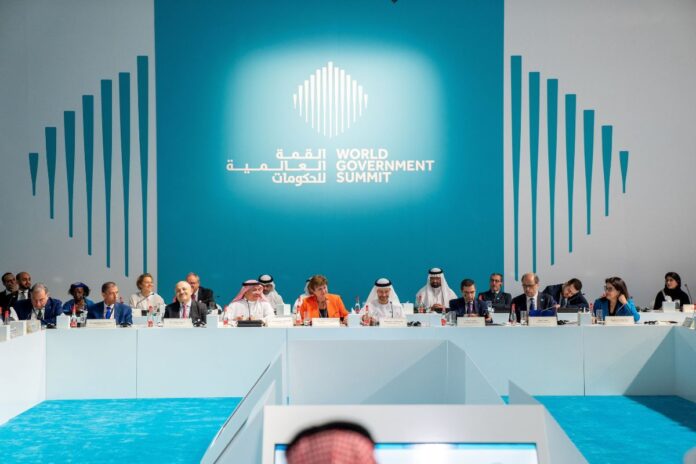Governments need to build resilience through fiscal policies to bolster economic stability against shocks, speakers told the annual Arab Fiscal Forum hosted at the World Government Summit 2023.
Speaking at the opening session of the Arab Fiscal Forum, Mohamed Hadi Al Hussaini, Minister of State for Financial Affairs, and Kristalina Georgieva, Managing Director of the International Monetary Fund (IMF), presented economic forecasts and proposed recommendations to strengthen economic resilience, support economic development in Arab countries and boost the framework for joint Arab action.
On the economic level, the speakers stressed the need for fiscal policies to contribute to enhancing the stability of the economy and accelerating growth.
During his speech, Al Hussaini said this forum’s edition comes amid the repercussions of the increasing global economic slowdown in the Arab region, the rising inflation, disruption of supply chains, geopolitical challenges, high food prices, and pressured financial conditions in the wake of the fiscal stimulus.
He also highlighted utilising fiscal policy tools to manage aggregate demand, continue to improve debt management, focus on financing through local markets, and draw development plans in line with current global economic developments.
Georgieva said the MENA region must have a robust framework to conduct fiscal policy and manage fiscal risks.
“With today’s shock-prone and uncertain world the conduct of fiscal policy takes on added significance,”
she said.
According to economic forecasts, Georgieva said, inflation will likely to “remain contained” in the Gulf Cooperation Council (GCC) countries.
“Inflation in the region is also expected to gradually decline “as commodity prices settle and tighter monetary and fiscal policies have their intended effect,”
she explained.
To build resilience, she urged countries in the region to boost tax revenues.
She also called for long-term planning and investment to address climate challenges and multilateral cooperation to tackle unsustainable debt.
Commending the collaboration among Arab countries, Georgieva said,
“Over the past five years, GCC countries have provided US$54 billion in financing for budget and balance-of-payments needs. They have also supported low-income countries, and fragile and conflict-affected states in the region, through debt reduction and food security support. This includes US$10 billion in support announced by the Arab Coordination Group last year.”
She added,
“Donor countries can further support regional economic stability and growth through multilateral initiatives.”
UAE’s economic contributions
Al Hussaini noted that the UAE has provided loans and development aid to developing countries during the period from 2012 to 2022 at a value of AED 255.5 billion (an average annual rate of 2 percent of the GDP), benefiting 148 countries around the world. This falls within the framework of the country’s policy aimed at supporting economic reform programmes and contributing to the implementation of development projects in Arab and non-Arab countries. Additionally, through the Arab Coordination Group, Arab countries have provided developing countries with US$245 billion in aid during the same period.
Al Hussaini said,
“The economic recovery is gaining momentum, thanks to the UAE’s early and strong response and the continuous macroeconomic policies. This is in addition to the strong reform efforts within the framework of the country’s 2050 strategy to encourage the private sector growth, promote non-oil growth, and attract foreign investment.”
He noted that taxes are an effective tool that has a significant impact on economic growth, as they are one of the sources of financing the budget and diversifying economic activity. As such, in December 2022, the UAE issued a law on introducing corporate tax, which will be effective from 1st June, 2023. Corporate tax facilitates enabling financial planning in the medium and long term, helps achieve the sustainability and stability of the federal budget, and maintains growth rates.
Economic growth in the UAE
At the end of his speech, Al Hussaini reaffirmed the UAE’s keenness to exchange multifaceted developmental expertise and experiences with various countries, through which the country was able to achieve real economic growth estimated at 5.9 percent during 2022 compared to 4.7 percent in 2021 (according to the World Bank report). Additionally, the UAE’s non-oil GDP increased by 6.1 percent in 2022, and the volume of non-oil foreign trade has risen to more than AED 1 trillion in the first half of 2022.
He stated that the UAE’s pioneering commercial and economic policies and initiatives have resulted in achieving unprecedented achievements in global competitiveness indices. The country ranked among the top 10 countries in more than 28 of the most prominent indicators of global competitiveness for the year 2022 in various sectors of finance, economy, trade, communications, information technology, and investment.
The 7th Arab Fiscal Forum was organised by the Ministry of Finance (MoF), in partnership with the Arab Monetary Fund (AMF) and the IMF.
The forum was held under the theme: “Fiscal Sustainability in the Arab World beyond the COVID-19 Pandemic: Challenges and Opportunities”, and it was organised on the sidelines of the 2023 edition of the World Government Summit (WGS 2023).
The forum’s sessions
The Arab Fiscal Forum included four sessions; the first, titled “Macroeconomic Developments and Prospects”, examined recent global and regional economic developments and the outlook, with a focus on key fiscal policy challenges and priorities. The second session, titled “Managing Climate Risks and Opportunities: Fiscal Policy and Climate Change”, was chaired by Al Hussaini, and focused on fiscal policy measures to address both the challenges and opportunities associated with climate change and to ensure a transition to a green economy.
“Managing Fiscal Risks” session explored the scope for enhanced fiscal risk management and its challenges for Arab countries. The fourth session, titled “Financing Fiscal Needs: Enhancing Domestic Revenue Mobilisation”, highlighted the importance of addressing the prevalence of large informal and hard-to-tax sectors or actors, to broaden the tax base and strengthen compliance.
At the end of the forum, a roundtable was organised for ministers. Arab finance ministers, Vítor Gaspar, Director of the Fiscal Affairs Department at IMF, and Dr. Abdulrahman Al Hamidy, Director-General, Chairman of the Board of the AMF, attended the roundtable.
News Source: Emirates News Agency
